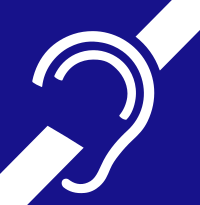
Photo from wikipedia
INTRODUCTION The medical information provided in medical consultations is exhaustive but poorly assimilated by patients and relatives. Hearing loss seems to be a further obstacle. The main objective of this… Click to show full abstract
INTRODUCTION The medical information provided in medical consultations is exhaustive but poorly assimilated by patients and relatives. Hearing loss seems to be a further obstacle. The main objective of this study was to compare medical information about cochlear implantation delivered in oral and written form ("standard" group) versus oral, written and digital form ("multimedia" group). The secondary objective was to assess hearing loss as a negative factor for understanding medical information, by comparing understanding in patients with unilateral versus bilateral profound hearing loss. PATIENTS AND METHOD A prospective single-center single-blind study was carried out from September 29, 2015 to June 22, 2016. Twenty-nine CI candidates were included: 11 in the "standard" group, 12 in the "multimedia" group and 6 in the "unilateral hearing loss" group. The primary endpoint was the result on a validated questionnaire (score from 0 to 14) assessing memorization of medical information. Patient satisfaction regarding the information delivered was assessed on a Likert scale. RESULTS Memorization scores were 4.6±2.7 and 9.7±2.4 respectively for the "standard" and the "multimedia" group (P=0.0006) and 9.05±1.9 for the "unilateral hearing loss" group. Comparison between the "standard" and "unilateral hearing loss" groups showed a significant difference (P=0.01). Satisfaction scores were highest for digital compared to the other forms of medical information delivery. CONCLUSION This study showed that a digital support improved understanding of medical information by candidates for cochlear implantation and that hearing loss was an obstacle to understanding medical information.
Journal Title: European annals of otorhinolaryngology, head and neck diseases
Year Published: 2017
Link to full text (if available)
Share on Social Media: Sign Up to like & get
recommendations!